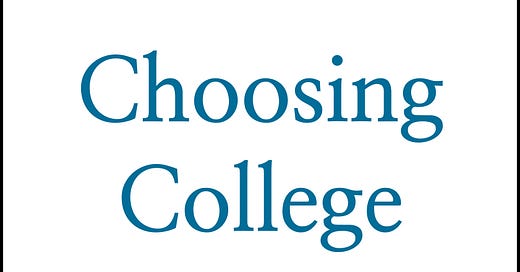Congratulations to the three winners of Todd Rogers and Jessica Lasky-Fink’s book Writing for Busy Readers. You’ll be receiving your copies in the mail shortly!
I also have some upcoming book news of my own. It’s about the book I’ve been writing with Ethan Bernstein (my friend and a professor at the Harvard Business School) and Bob Moesta (my longtime collaborator at the Rewired Group). Stay tuned for updates!
The Wild West of Dual Enrollment: Its Growth, Benefits, and Drawbacks
Longtime readers of the Future of Education know that I’ve long had my concerns around dual enrollment—the trend of high school students taking college courses. You can read one of my past pieces about the practice here. Although I love anything that blurs the lines between different parts of our education system, I’ve wondered if what students are learning in courses that are often taught by high-school teachers will actually count for credit in college and how rigorous the learning experience is. Is it really college material, in other words?
In our latest Future U. episode, Jeff Selingo and I interviewed John Fink, a senior research associate at the Community College Research Center, to learn more. I left with a much stronger sense of when dual enrollment helps and what it takes for it to be productive for students. I also left with a sense of just how many different arrangements—36!—there are for dual enrollment—as well as how widespread dual enrollment is today in high school with 1.5 million students taking college courses (70% of which is through community colleges).
Finally, I still see dual enrollment as a bit of a missed opportunity—one in which we could be focusing on learning outcomes to help move to a mastery-based learning model and better guaranteeing value for students. But we aren’t doing so.
Check out the full episode on this growing practice here.
Building a Global University
Among the boards I serve on, one of the most exciting is as a trustee for Minerva University—a relatively new entrant into the group of selective universities.
As Mike Magee, its president, said, “Our mission is to develop leaders, problem-solvers, and entrepreneurs from every corner of the globe and to weave them together as one community committed to a world that is safe, sustainable and equitable.”
Indeed, over 85% of Minerva’s students are not from the United States. And the student body lives around the globe in different cities ranging from Seoul to Buenos Aires and London during their four years of study.
I believe having entrant universities like Minerva—which has a focus on student learning and development as opposed to research and also charges far less in tuition than the Ivy-plus universities—is critical for creating needed change in higher education.
A new article in LearningWell magazine does a great job of profiling the University. It was my pleasure to offer my take on what we’re trying to accomplish, but also to see one of my graduate students who is an alum of Minerva University quoted in the article.
No Silly Questions – An Education Podcast for Parents
I joined Danielle Freilich and Jordana Fruchter on their podcast to talk about “What are colleges looking for?” As they wrote:
“As our 15 year college reunions approach, we can still vividly remember how much we dreaded studying for the SATs and the stress we felt waiting for our college acceptances. But will this be the same for our kids? Today, we bring on Michael B. Horn to help us understand what’s changed since our day- what’s stayed the same- and how we can get better at “Choosing College” - which is in fact the name of his book!”
The ‘demographic cliff’ is coming. Colleges must be prepared.
Finally, the Boston Globe editorial board wrote a thoughtful piece about the changes coming in higher education—and I was honored to be quoted again. As you all know, I’ve been harping on the coming demographic decline and the college closures that will mount accordingly. Check out the Boston Globe’s take—and my quotes—here.
The piece spurred some reader activity. One of the letters to the editor that the editorial spurred, “Schools aren’t doing enough to prepare students in career management”—also quoted me and is available here.
Given that my next book is about how to help individuals make their next job move more successfully, well, you won’t be surprised that I think the writer is on to something.
As always, thanks for reading, writing, and listening.





